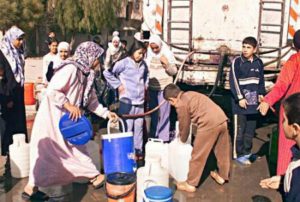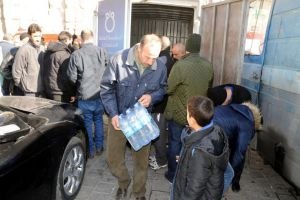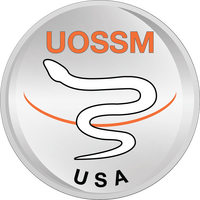Washington DC- The bombing of the Ayn al Feeja water facility in Wadi Barada on December 24 has left over 5 million people without fresh, running water for the past 30 days. Concerns are growing over a health epidemic with a sharp rise in severe gastrointestinal cases, according to a doctor from Ibn Nafis Hospital in Damascus. The price for a box of six water bottles has skyrocketed to 1000 Syrian Layras.
A fierce bombardment continues to affect the villages of Wadi Barada. According to a representative from the Wadi Barada Media Council, on Friday one medical staff was killed, the executive director of the medical council was wounded, and an ambulance was targeted and destroyed by artillery shelling as it was transporting the wounded through an area supposedly under a ceasefire agreement. The continued targeting of Wadi Barada with heavy artillery and barrel bombings, has led to more damage to the Ayn al Feeja water facility.
An orthopedic surgeon from Damascus said, “We are very concerned that over 5 million people in Damascus have not had access to clean water for a month. The situation could lead to a catastrophe as the risk of hepatitis A, cholera and parasitic diseases rise due to large populations using contaminated water. Water is life and people need to have this basic human necessity to survive. We are concerned that we are not able to access people in besieged areas. We have a medical staff member who walks for 8 ½ miles to communicate the situation in Wadi Barada with us. This is absolutely unacceptable.”
While the people of Aleppo have been evacuated from the besieged area, many people throughout Syria are suffering greatly, with no access to food, water or medical care. A lack of communication and information from these areas has made it extremely difficult to perform needs assessments, assess medical facility capacity, and receive accurate numbers of those injured and killed from daily attacks. The lives of hundreds of thousands in besieged areas are still in danger.
In Deir Ezzor thousands of civilians are trapped in the crossfire. The shortage of doctors in the area has left many without any access to medical care.
Dr. Khaula Sawah of UOSSM USA said, “Hundreds of thousands of lives are still in danger and we must not forget them, Wadi Barada is the new Aleppo, with a brutal besiegement and a brutal bombardment of the area. Many are being wounded in these attacks and we have no way of getting to them, they are living without the basic necessities of life including water, food and access to medical care, this is a denial of basic human rights and is unacceptable. We call on the international community to ensure water facilities in Wadi Barada are repaired immediately, and humanitarian aid delivered to civilians in Wadi Barada, Deir Ezzor, and in other besieged areas throughout Syria.”
Dr. Sawah added, “We hope that the meeting in Astana today is a promising step towards peace, stability and safety of the people of Syria. We urge the international community and the UN to send international observers and blue helmets to Syria, especially in the besieged areas to ensure the safety of civilians and fair and safe access to basic human needs. “




